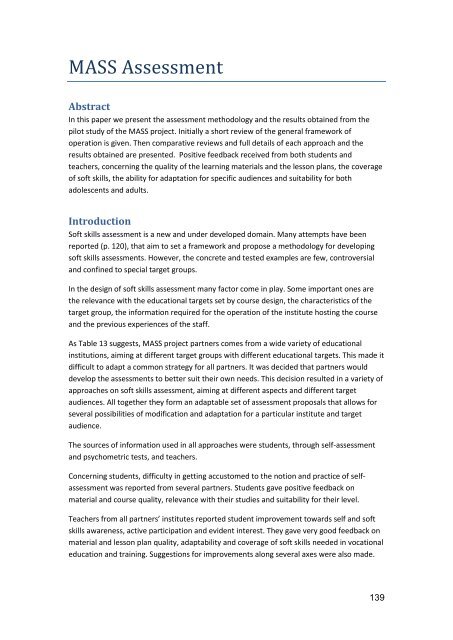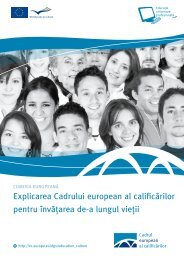Teaching and Assessing Soft Skills - MASS - Measuring and ...
Teaching and Assessing Soft Skills - MASS - Measuring and ...
Teaching and Assessing Soft Skills - MASS - Measuring and ...
Create successful ePaper yourself
Turn your PDF publications into a flip-book with our unique Google optimized e-Paper software.
<strong>MASS</strong> Assessment<br />
Abstract<br />
In this paper we present the assessment methodology <strong>and</strong> the results obtained from the<br />
pilot study of the <strong>MASS</strong> project. Initially a short review of the general framework of<br />
operation is given. Then comparative reviews <strong>and</strong> full details of each approach <strong>and</strong> the<br />
results obtained are presented. Positive feedback received from both students <strong>and</strong><br />
teachers, concerning the quality of the learning materials <strong>and</strong> the lesson plans, the coverage<br />
of soft skills, the ability for adaptation for specific audiences <strong>and</strong> suitability for both<br />
adolescents <strong>and</strong> adults.<br />
Introduction<br />
<strong>Soft</strong> skills assessment is a new <strong>and</strong> under developed domain. Many attempts have been<br />
reported (p. 120), that aim to set a framework <strong>and</strong> propose a methodology for developing<br />
soft skills assessments. However, the concrete <strong>and</strong> tested examples are few, controversial<br />
<strong>and</strong> confined to special target groups.<br />
In the design of soft skills assessment many factor come in play. Some important ones are<br />
the relevance with the educational targets set by course design, the characteristics of the<br />
target group, the information required for the operation of the institute hosting the course<br />
<strong>and</strong> the previous experiences of the staff.<br />
As Table 13 suggests, <strong>MASS</strong> project partners comes from a wide variety of educational<br />
institutions, aiming at different target groups with different educational targets. This made it<br />
difficult to adapt a common strategy for all partners. It was decided that partners would<br />
develop the assessments to better suit their own needs. This decision resulted in a variety of<br />
approaches on soft skills assessment, aiming at different aspects <strong>and</strong> different target<br />
audiences. All together they form an adaptable set of assessment proposals that allows for<br />
several possibilities of modification <strong>and</strong> adaptation for a particular institute <strong>and</strong> target<br />
audience.<br />
The sources of information used in all approaches were students, through self-assessment<br />
<strong>and</strong> psychometric tests, <strong>and</strong> teachers.<br />
Concerning students, difficulty in getting accustomed to the notion <strong>and</strong> practice of selfassessment<br />
was reported from several partners. Students gave positive feedback on<br />
material <strong>and</strong> course quality, relevance with their studies <strong>and</strong> suitability for their level.<br />
Teachers from all partners’ institutes reported student improvement towards self <strong>and</strong> soft<br />
skills awareness, active participation <strong>and</strong> evident interest. They gave very good feedback on<br />
material <strong>and</strong> lesson plan quality, adaptability <strong>and</strong> coverage of soft skills needed in vocational<br />
education <strong>and</strong> training. Suggestions for improvements along several axes were also made.<br />
139





